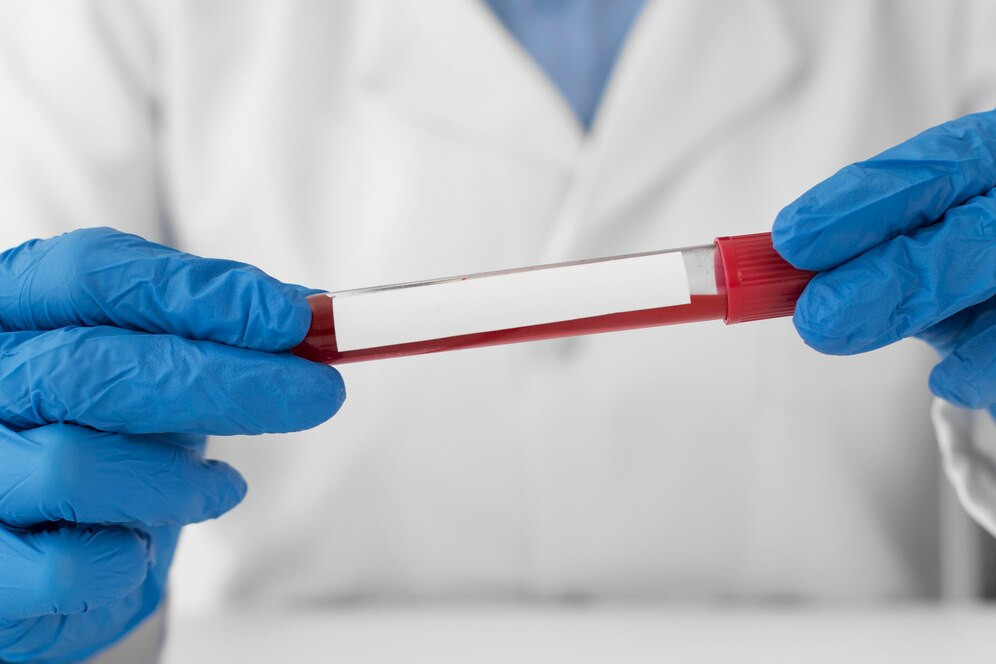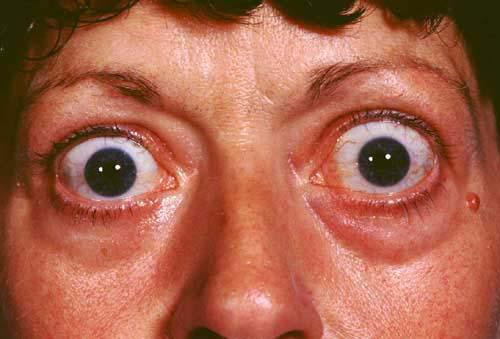Definisi
Pemeriksaan T4 adalah pemeriksaan untuk mengukur kadar T4 (thyroxine) di dalam darah. Pemeriksaan T4 dapat membantu untuk menegakkan diagnosis terkait dengan penyakit tiroid dan juga untuk menilai fungsi dari kelenjar tiroid..
Tiroid merupakan kelenjar yang berbentuk seperti kupu-kupu dan terletak di bagian depan leher. Kelenjar ini berfungsi menghasilkan hormon yang mengatur proses metabolisme di dalam tubuh, salah satunya adalah thyroxine atau T4. Hormon ini memiliki fungsi penting dalam proses pencernaan, fungsi otot, dan kesehatan tulang.
T4 memiliki 2 bentuk, yaitu:
- T4 bebas, merupakan bentuk aktif dari hormon thyroxine dan tidak terikat protein
- T4 terikat, merupakan bentuk yang terikat dengan protein dan banyak terdapat di aliran darah dibandingkan dengan T4 bebas
Karena T4 memiliki 2 bentuk berbeda, maka pemeriksaannya pun ada 2 jenis, yaitu pemeriksaan T4 total dan pemeriksaan FT4 (Free T4).
Pada pemeriksaan T4 total, kadar T4 yang bebas dan terikat akan diperiksa, namun pemeriksaan ini dinilai kurang akurat untuk menilai kinerja kelenjar tiroid. Sedangkan pada pemeriksaan FT4, hanya kadar T4 bebas yang akan diperiksa. Pemeriksaan ini dinilai lebih efektif dibandingkan pemeriksaan T4 total.
Indikasi
Pemeriksaan ini biasanya dikerjakan pada beberapa kondisi sebagai berikut, yaitu:
- Untuk membantu penegakkan diagnosis penyakit kelenjar tiroid
- Untuk membantu menilai apakah ada kelainan fungsi kelenjar tiroid apabila terdapat gejala dan tanda tertentu
- Untuk memantau perkembangan penyakit setelah pemberian terapi
- Untuk penapisan atau skrining pada orang yang berisiko tinggi terkena penyakit tiroid (terutama pada anggota keluarga yang memiliki riwayat penyakit tiroid)
- Untuk menilai kondisi lainnya, seperti kelainan pada kelenjar hipofisis atau hipotalamus
Baca Juga: Penyakit Tiroiditis - Definisi, Penyebab, Gejala, dan Tata Laksana | AI Care (ai-care.id)
Kontraindikasi
Tidak ada kontraindikasi atau kondisi yang membuat seseorang tidak bisa melakukan pemeriksaan ini.
Persiapan Sebelum Pemeriksaan
Tidak ada persiapan khusus sebelum melakukan pemeriksaan T4. Pemeriksaan ini bisa dilakukan dalam keadaan tidak berpuasa. Meskipun demikian, Anda disarankan untuk melakukan konsultasi medis terlebih dahulu kepada dokter sebelum melakukan pemeriksaan T4 sebab ada beberapa kondisi tertentu yang dapat menganggu hasil laboratorium sehingga tidak menggambarkan kondisi Anda yang sesungguhnya.
Informasikan juga kepada dokter mengenai obat-obatan yang sedang Anda konsumsi, karena beberapa obat dapat memengaruhi hasil pemeriksaan. Obat-obatan yang dapat memengaruhi hasil pemeriksaan T4 antara lain:
- Obat yang mengandung hormon, seperti pil KB
- Obat untuk mengatasi penyakit tiroid
- Obat kanker
- Obat golongan steroid
Prosedur Pemeriksaan
Pemeriksaan T4 umumnya menggunakan sampel serum darah sebanyak 0,25 - 0,5 ml. Sampel serum darah ini diambil dari pembuluh darah vena dan akan dikumpulkan ke dalam tabung khusus. Petugas laboratorium akan memakai sarung tangan khusus dan APD (Alat Pelindung Diri) saat mengambil sampel pemeriksaan.
Sebelum mengambil darah, petugas akan memasang pita elastis dan membersihkan area penusukan jarum dengan kasa antiseptik. Biasanya petugas mengambil darah di area lipatan siku. Setelah darah diambil dan dimasukkan ke dalam tabung khusus, petugas akan melepas pita elastis yang terpasang, menekan dan membersihkan area penusukan dengan kasa antiseptik.
Prosedur pemeriksaan ini hanya berlangsung selama beberapa menit saja. Sampel darah yang telah didapatkan akan diperiksakan menggunakan alat khusus di laboratorium, dan hasilnya bisa diketahui dalam beberapa jam kemudian.
Baca Juga: Pemeriksaan Pemeriksaan FT4 - Indikasi, Prosedur, dan Hasil Pemeriksaan | AI Care (ai-care.id)
Nilai Normal dan Abnormal
Secara umum, berikut ini merupakan rentang nilai normal dan abnormal pada hasil pemeriksaan T4.
|
Nilai (mcg/dL) |
Interpretasi |
|
<5 |
Rendah |
|
5 – 12 |
Normal |
|
>12 |
Tinggi |
Meskipun demikian, setiap laboratorium memiliki rentang nilai yang sedikit berbeda antara satu laboratorium dengan laboratorium lainnya. Hal ini terjadi karena perbedaan alat atau mesin yang digunakan.
Hasil dan Saran (Pemeriksaan Lanjutan)
Rendah
Jika hasil pemeriksaan T4 Anda menunjukkan nilai rendah, maka kemungkinan Anda mengalami kondisi berikut:
- Hipotiroidisme
- Tiroiditis
- Kekurangan yodium
- Malnutrisi
- Efek samping obat, seperti obat golongan steroid atau obat untuk mengatasi penyakit tiroid
- Gangguan pada kelenjar hipofisis
Meskipun demikian, pemeriksaan T4 baru dapat dipahami sepenuhnya apabila dilakukan pemeriksaan hormon tiroid lainnya seperti TSH atau T3.
Normal
Jika hasil pemeriksaan T4 Anda menunjukkan nilai normal, kemungkinan Anda telah menjalankan pola hidup sehat dengan baik dan tidak ada kelainan yang berhubungan dengan penyakit tiroid apabila tidak ada gejala dan tanda klinis tertentu.
Anda disarankan untuk tetap mempertahankan pola hidup sehat Anda saat ini sehingga dapat mencegah penyakit tiroid yang ditandai oleh nilai T4 yang terlalu tinggi atau rendah.
Tinggi
Jika hasil pemeriksaan T4 Anda menunjukkan nilai tinggi, maka kemungkinan Anda mengalami kondisi berikut:
- Hipertiroidisme
- Toxic goiter (pembesaran pada kelenjar tiroid yang menyebabkan produksi hormon tiroid berlebihan)
- Kelebihan yodium
- Tingginya kadar protein di dalam darah
- Penggunaan obat pengganti hormon tiroid yang berlebihan
- Adanya tumor pada kelenjar hipofisis
- Penyakit trofoblastik, tumor langka yang terjadi pada kehamilan tidak normal
Konsultasikan ke Dokter yang Tepat
Hasil pemeriksaan T4 pada orang dewasa dapat dikonsultasikan dengan dokter umum, untuk selanjutnya dilakukan pemeriksaan lanjutan ataupun memulai terapi untuk diagnosis yang sesuai. Anda juga dapat berkonsultasi dengan dokter spesialis penyakit dalam konsultan metabolik dan endokrin untuk berdiskusi mengenai masalah T4 Anda lebih jauh. Pada pasien anak, hasil pemeriksaan selain normal harus dikonsultasikan dengan dokter spesialis anak.
Mau tahu informasi seputar hasil pemeriksaan laboratorium, radiologi, dan lainnya? Cek di sini, ya!
- dr Nadia Opmalina
Thyroxine (T4) Tests. (2022). Retrieved 28 November 2022, from https://medlineplus.gov/lab-tests/thyroxine-t4-test/
What’s a T4 Test?. (2019). Retrieved 28 November 2022, from https://www.healthline.com/health/t4-test
T4 (Thyroxine) Test. (2022). Retrieved 28 November 2022, from https://my.clevelandclinic.org/health/diagnostics/24235-thyroxine-t4-test
What is a T4 (Thyroxine) Blood Test?. (2021). Retrieved 28 November 2022, from https://www.webmd.com/a-to-z-guides/what-is-t4-thyroxine-blood-test
T4 Blood Test (Thyroxine). (2021). Retrieved 28 November 2022, from https://www.testing.com/tests/t4-test/
T4 (Throxine) Test. (2022). Retrieved 28 November 2022, from https://www.uclahealth.org/medical-services/surgery/endocrine-surgery/patient-resources/patient-education/endocrine-surgery-encyclopedia/t4-thyroxine-test
What to Know About T4 Levels. (2020). Retreieved 28 November 2022, from https://www.medicalnewstoday.com/articles/t4-levels












